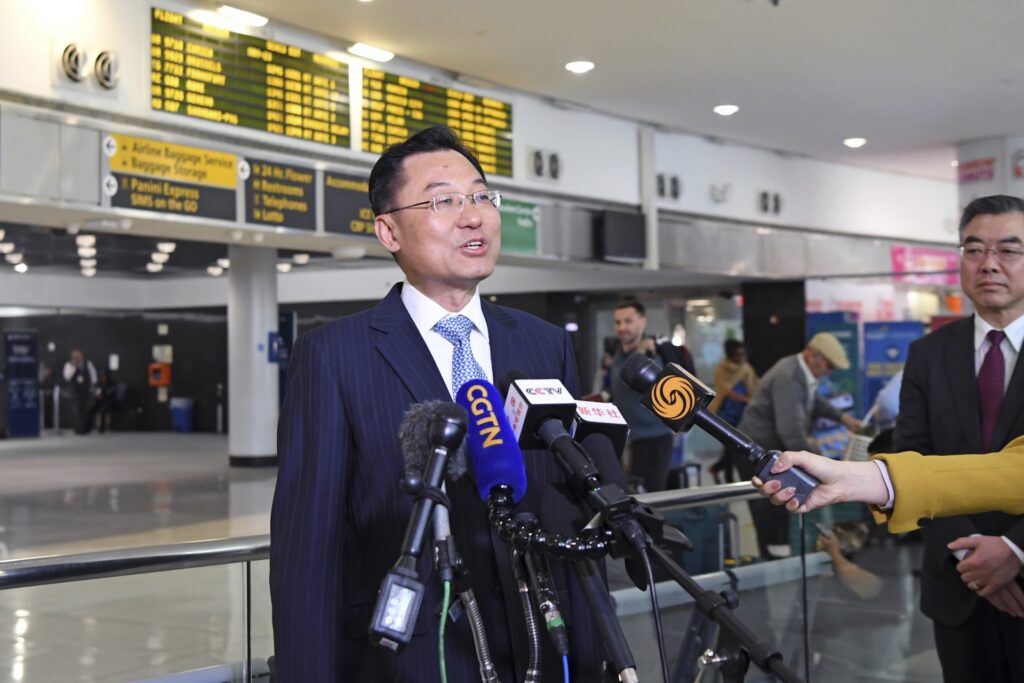Treasury Secretary Janet Yellen met with Chinese Ambassador Xie Feng on Monday, ahead of Yellen’s scheduled trip to Beijing this weekend. According to Chinese state media, Xie strove to send a “clear and positive message” that China is ready to improve bilateral relations.
Of course, China’s state-run Global Times portrayed the meeting as the pure and virtuous Chinese ambassador explaining to Yellen that Beijing has always done everything right, for all of the right reasons, and it is time for the United States to put aside its irrational obsession with little things such as forced labor, genocide, espionage, territorial aggression, and world-ravaging coronavirus plagues:
During the face-to-face meeting on Monday, Ambassador Xie noted that a healthy and stable China-US relationship is in the common interests of the two countries and is also the common expectation of the international community, according to a statement from the Chinese Embassy in the US.
China has always viewed and handled the bilateral relations in accordance with the principles of mutual respect, peaceful coexistence, and win-win cooperation, Xie said.
The Chinese ambassador highlighted the expectation that both sides should strengthen dialogue and carry out cooperation with sincerity, and help China-US relations to stabilize and return to the right track.

In this photo released by Xinhua News Agency, Xie Feng, China’s new ambassador to the United States, speaks to the media upon his arrival at the John F. Kennedy International Airport in New York, the United States, on May 23, 2023. (Li Rui/Xinhua via AP)
The Global Times hopefully recalled Yellen expressing her preference for “constructive” economic relations instead of “decoupling” from China. Communist China’s top international objective at the moment is putting an end to not just “decoupling” but even “de-risking,” a less severe strategy for diversifying supply chains and moving some manufacturing out of China instead of completely severing economic ties.
The Biden administration has taken pains to assure China that decoupling is off the table. Secretary of State Antony Blinken explicitly stated the administration is “not looking to decouple from China” after his own meeting with dictator Xi Jinping in Beijing on June 19.
Blinken said the administration is still interested in “de-risking and diversifying,” so China will probably try to get Yellen to back away from de-risking during her visit. Fox Business anticipated Yellen would talk with the Chinese about their menacing new “Foreign Relations Law,” which could drive away the foreign business Beijing has been eager to retain by making it much easier for companies to be accused of espionage, so a deal might take shape in which China loosens up on the Foreign Relations Law in exchange for the Biden administration pulling back from de-risking. To date, the administration has given no sign of lifting the tariffs on Chinese imports that encourage de-risking strategies.
RELATED VIDEO — White House: “We’re Going to Be Able to Cooperate with” China on Climate, “Maybe Even Some Economic and Trade Ideas”:
“The Chinese engage in concessions-based diplomacy. They will demand that the U.S. remove tariffs and sanctions before even discussing any of the areas of concern that the Biden Administration has prioritized including a restoration of military-to-military communications,” former Deputy Assistant Secretary of Defense for East Asia Heino Klinck told Fox Business on Wednesday.
The far-left New York Times (NYT) expected Yellen to do little more than open some lines of communication with Chinese Communist officials, noting that her meeting with Ambassador Xie on Monday was clearly a bit chilly despite all the official statements from both sides about how “productive” it was.
The most contentious trade issue between the U.S. and China is shaping up to be semiconductor chips, as the U.S. and its allies are limiting exports of advanced technology to China and Beijing is retaliating by restricting the export of metals needed to make the chips.
“The Biden administration’s subsidy program to strengthen the U.S. semiconductor industry has also rankled Chinese officials, especially since it includes restrictions on investing in China,” the NYT noted.
RELATED VIDEO — Janet Yellen: Chinese Depositors to Silicon Valley Bank to Be Made Whole:
C-SPAN
“In the United States, companies with ties to China, like the social media app TikTok, the shopping app Temu and the clothing retailer Shein, are facing increasing scrutiny over their labor practices, their use of American customer data and the ways they import products into the United States,” the NYT added, painting a very different picture than the Global Times burbling about Yellen sitting quietly while Xie explained how China never does anything wrong.
Former Vice Minister of Commerce Wei Jianguo told Chinese state media on Wednesday that Beijing is preparing even more stringent trade restrictions on semiconductor metals if the U.S. continues with its high-tech export restrictions.
“This is just the beginning of China’s countermeasures, and China’s tool box has many more types of measures available. If the high-tech restrictions on China become tougher in the future, China’s countermeasures will also escalate,” Wei warned.
Bloomberg News on Tuesday advised Xi Jinping to remember he holds “a much weaker economic hand than he has in the past,” as China’s post-coronavirus recovery fizzles out, youth unemployment soars, and foreign investors grow increasingly nervous about the Foreign Relations Law and other examples of Beijing’s paranoia.
“The struggling Chinese economy gives the U.S. some leverage. When Yellen lands in Beijing, she should capitalize on this moment to encourage China to embrace a more moderate course. Above all, she should press for greater protection of U.S. businesses in China,” Bloomberg said, urging Yellen to hold firm on U.S. technology sanctions.


